Is vaccinating chickens necessary?

Table of Contents
- Do Backyard chickens need vaccinations:
- Is it safe to vaccinate chickens?
- Are all chickens vaccinated?
- What are chicken vaccines?
- The types of vaccine:
- How long are poultry vaccines effective for?
- How to tell if your chickens has been vaccinated?
- Should you buy vaccinated chickens?
- What are chickens routinely vaccinated for?
- What chickens diseases can make people sick?
- Why don't some breeders vaccinate their poultry?
- Should you vaccinate your chickens?
- Can you vaccinate older chickens?
- Is there herd immunity in chickens?
- Which countries vaccinate their chickens?
- NPIP and poultry diseases:
- Do chickens need to be vaccinated?
- How are chickens vaccinated?
- There are 10 ways that vaccines can be delivered:
- What equipment do you need to vaccinate chickens?
- What training do you need to vaccinate poultry?
- Where to get vaccines from?
- Vaccination schedule:
- How do you Store vaccines?
- Can chickens catch rabies?
Do Backyard chickens need vaccinations:
So, should you be giving your chickens shots like any other family pet?
Vaccination plays an important part in the health of any flock. There are numerous diseases that are prevented by vaccinating the bird and this is mostly done at day old or even in some cases before.
I personally do not vaccinate the chickens I breed myself as I am not a large producer but I have bought laying hybrids in the past that are vaccinated. It is a good way to reduce or prevent the effects of specific poultry diseases.
If you have family members that elderly, pregnant or immunologically compromised then you should seriously consider getting vaccinated chickens.
You should talk a veterinary professional for specific advice relating to your flock. This article is for reference and requirements differ depending on your location. It may be that the best method for your flock is bio security.
Below: Vaccinating day old chicks.
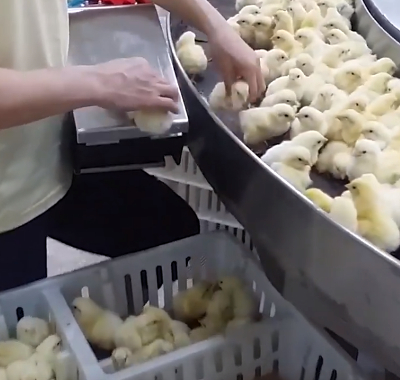
It is important to remember that vaccines need to be given early in life and before the disease is in your flock to be effective. You can't dose birds that are already ill and expect it to work.
Is it safe to vaccinate chickens?
Absolutely. It is completely safe for both you and the chickens. It will make your environment as the keeper safer from some infections as well.
Vaccines for poultry were developed to improve the death rates, create herd immunity, and to reduce the potential transmission of diseases among chickens kept in cramped commercial production facilities.
Although you can have a backyard flock treated there is a law of diminishing returns for the common backyard flock you and I keep.
It is important to remember inoculations are not a substitute for common sense, bio security and everyday hygiene.
Are all chickens vaccinated?
Not all chickens are vaccinated. If you have bought your chickens from a reputable producer then the supplier will have vaccinated them. Most hatcheries will do it for you for a small fee.
Below: Some chickens are dosed before they even hatch. These are unhatched chicks being dosed before they hatch.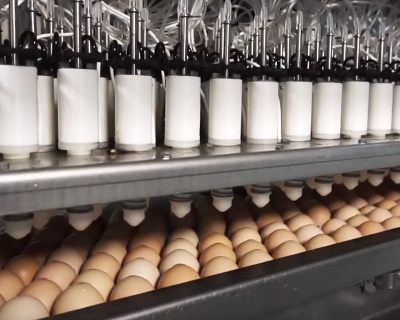
Commercial flocks travel large distances and live in close conditions so it makes sense to protect your investment by inoculating them against the common killers. My flock, on the other hand, never leaves my property except for a few chicken shows.
Commercial birds tend to have very short lives, 6 to 10 weeks for meat chickens and 80 weeks for layers. This ensures the vaccines protect the hens for their whole life which may not be the case for a standard backyard flock where the birds are kept for many years.
What are chicken vaccines?
Vaccines are a safe version of the disease that primes the immune system of the chickens. They work by mimicking the the natural infection without any of the harmful effects of the disease.
The origin of the word vaccine - "matter used in vaccination," 1846, from Latin vaccina, fem. of vaccinus "pertaining to a cow" The reference to cows comes from Edward Jenner and his work on cow pox.
A vaccine is defined as: "a pharmaceutical substance used to stimulate the production of antibodies and provide immunity against one or several diseases, prepared from the causative agent of a disease, its products, or a synthetic substitute, treated to act as an antigen without inducing the disease."
The reality is they are liquids that contain live but inactivated versions of the disease. Some vaccines, like Mareks, are versions of the virus that cause no symptoms but provoke an immune response in the chicken protecting it from more virulent versions of the virus.
- Injected into the egg during the last stages of incubation.
- Sprayed over the birds after they hatch.
- Added to their water during the first 30 days.
They are often partnered with an indicator so you can see that they have been treated and the product properly applied.
You may need a prescription from a vet and some basic training before you do it yourself, you don't want to end up giving yourself the needle and a dose of a drug that was meant for a different species.
The types of vaccine:
Live vaccine – the active part of the vaccine is the live organism that causes the disease and is capable of inducing the disease in birds. Vaccinated birds, in many cases are able to infect non-vaccinated birds if housed together.
Attenuated vaccine – with this type of vaccine the organism has been weakened by special procedures during manufacture so that it has lost its ability to cause the serious form of the disease.The chickens contract a very mild form of the disease.
Killed vaccine – with this type of vaccine the organism has been killed and is unable to cause the disease, although the ability to trigger the immune system remains. As a rule the level of immunity produced by this form of vaccine is weaker than that produced by live and attenuated vaccines.
How long are poultry vaccines effective for?
There is considerable research that shows they become ineffective beyond the 2 year mark. This is why you need to get your family pets their shots every year.
This means that your older hens no longer enjoy the protection the did when they were younger.
Live vaccines tend to be more effective and last for longer than the inactivated versions as they provoke a better immune response from the chickens.
Chickens are never given booster doses like other family pets.
It is worth remembering that vaccines are not always 100% effective in preventing the disease for which they are produced. There are many complex reasons as to why some vaccines may not work.
How to tell if your chickens has been vaccinated?
There is no definite way to know if your chickens have been given their vaccinations.
Poultry in general and chickens in particular a seldom if ever given vaccination certificates like other family pets.
There is no absolute way to tell that a chicken has been vaccinated but there are a few measure you can use to make an educated guess.
- Buy from NPIP or accredited suppliers.
- Look online at the company details for the organisation that you buy from.
- Commercial hybrids are probably vaccinated.
Should you buy vaccinated chickens?
This is a matter of personal choice for the backyard keeper. I have seen isolated flocks of chickens that have never gotten ill.
If you live in an area where there are a lot of chickens kept, plenty of wild birds about then it makes sense to buy vaccinated chicken or vaccinate your flock.
Below: Day old chicks being vaccinated.
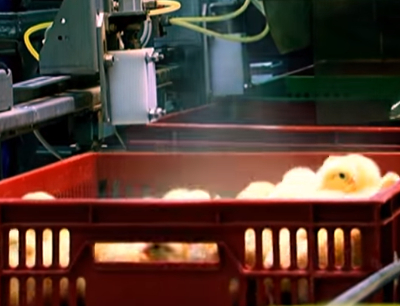
If you bought your chickens for a commercial operation or from a large federal or government registered producer then in all likely hood they have been vaccinated against Mareks disease and a few others.
On the other hand if you bought them from a local backyard breeder then they probably have not.
Buying chickens from a specialist breeder who shows their birds are likely to have been vaccinated as day old chicks and this helps protect high value of show chickens.
What are chickens routinely vaccinated for?
Conventional poultry are usually vaccinated against a variety of diseases including:
Salmonella - Salmonella bacteria is passed from infected hens to the eggs while they are forming. The salmonella vaccines work both by reducing the number of hens that get infected and by making transmission to the eggs more difficult.
Mareks disease - Is given to day old chicks, both broilers and layers. It’s given subcutaneously, which means below the skin. In most cases it’s given in the breast of your day old chick.
Mycoplasma gallisepticum infections - This is a bacterial infection that can cause a chronic respiratory infection as well as other symptoms. The vaccine can be given in 3 ways between 10-14 weeks of age, either intraocularly (in the eyeball with eye drops), by a spray or by injection.
Newcastle disease - The vaccine is given between 14-21 days of age in the water and consistently every 2 weeks to 90 days old.
Infectious bronchitis - Is an extremely contagious viral disease that affects chickens of all ages and types. It affects the upper respiratory tract, the female reproductive tract, and some strains causes nephritis. Both live and inactivated vaccines are available and are used extensively. Live vaccines induce a mild respiratory condition and are applied in drinking water or as a spray.
Infectious Bursal Disease - is a viral disease of the bursa, and it can interfere with immune system development as chicks age. The vaccine is usually given 14-21 days old via water.
Infectious laryngotracheitis - Infectious laryngotracheitis highly contagious herpes virus infection of chickens and pheasants characterised by severe dyspnea, coughing, and rales.
Fowl pox - Fowlpox is a viral infection of chickens and turkeys characterised by lesions in the skin that progress to thick scabs and by lesions in the upper GI and respiratory tracts. Virulent strains may cause lesions in the internal organs. Fowlpox is seen worldwide and the vaccine is usually given in the wing web at 10-12 weeks old.
Encephalomyelitis - Given in the wing web at 10-12 weeks old
Fowl cholera - A serious, highly contagious disease caused by the bacterium Pasteurella multocida in a range of avian species including chickens, turkeys, and water fowl. A live oral vaccine is administered at 6 weeks.
Laryngotracheitis - This is a viral infection. Inoculation is applied at 10-12 weeks, intraocularly (in the eyeball) with eye drops.
Not all chickens in every location around the world are treated for every disease, chickens you buy may be immunised against certain diseases but not others. Salmonella is mandatory in the UK and the EU for example.
Since these diseases can also infect organic poultry, a routine vaccination program is recommended.
What chickens diseases can make people sick?
Certain chicken diseases can effect humans and your chickens should be vaccinated against diseases that could be injurious to humans if they are handling the birds, eating the meat or the eggs.
Humans can catch a few bugs from their hens, namely:
- Salmonella. Salmonella spreads to people through contaminated eggs and meat or faeces of certain backyard poultry.
- E coli. Escherichia coli or E.coli, are bacteria found in the environment, foods, and intestines of people and animals, including poultry.
- Bird flu or Avian influenza. Avian influenza is a virus whose hosts include many species of poultry.
- Campylobacter is a type of bacteria that spreads to people through contaminated food like meat and eggs, water or touching the faeces of infected animals.
- West Nile Virus. WNV infection can be rarely fatal in people but is more often associated with flu like symptoms. West Nile virus is carried by birds and spread by mosquitoes.
Why don't some breeders vaccinate their poultry?
It is generally just a matter of scale. A breeder who produces millions of pullets every year can vaccinate them for a penny or so whereas the cost for a small breeder is closer to the half dollar / pound mark.
Below: It takes planning and resources to vaccinate a backyard flock:
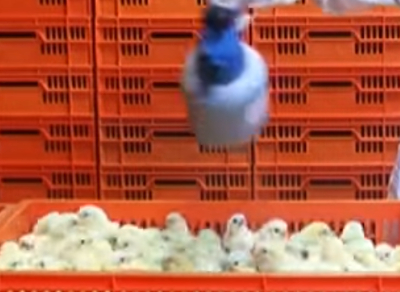
Should you vaccinate your chickens?
This is a difficult question. I have spoken to breeders who would never and some that would always. The answer here is it depends on your situation and where you will be keeping them.
Vaccination does not last forever and a hatchery pullet may still get a disease it was treated for at day old. This is the reason often given by some producers who do not vaccinate, they say it isn't worth it.
This is a purely personal decision and I'm not going to tell you that you must. It is a truth however that it does help with the overall health of the flock and if you have a flock above a certain size you may have to by law.
Can you vaccinate older chickens?
No. Vaccines are ineffective beyond a certain age. Most are given at day old and all are administered by 14 weeks of age. There is a vaccination schedule below.
Is there herd immunity in chickens?
Yes, there is herd immunity in any species that flock or herds together. This is a reference to the whole flock being immune to a disease even though only a percentage of the chickens actually are.
Can other chickens catch immunity from Mareks from other chickens.
This may seem like an odd question but the vaccination for Mareks disease is a strain of the virus that causes no symptoms or damage to internal organs or nerves. It is administered as a spray to the boxes of newly hatched chicks during sexing and processing. Provided they are in contact during the few days when they have the disease there can be transmission but as the vaccine is a symptom-less strain you would be unlikely to notice.
Which countries vaccinate their chickens?
It is a safe bet to say all countries with any commercial chicken flocks will follow some sort of vaccination regimen. It will be different vaccines for different types like layers or broilers, with the exception of a few that are common.
In all the countries I've researched in North, Central and South America plus quite a few in Europe, they all vaccinate against Mareks's Disease and Newcastle Disease.
Most of the breeding flocks are developed between a few European countries and the US, and it's more likely that other countries are prone to the same common diseases which will require vaccines.
NPIP and poultry diseases:
The National Poultry Improvement Plan was established in the early 1930's to provide a cooperative program for the improvement of poultry throughout the country.
The development of the NPIP was initiated to eliminate Pullorum Disease caused by Salmonella pullorum which was rampant in poultry and could cause upwards of 80% mortality in chicks.
The program was later extended and refined to include testing and monitoring for many other diseases.
Do chickens need to be vaccinated?
Any chicken destined for the commercial production environment has to have the full range of vaccines. Chickens for the backyard garden keeper do not have to have had their shots.
Birds in small flocks in isolated backyards are much less likely to catch poultry disease as and have much less need for vaccinations.
How are chickens vaccinated?
There are a couple of different types that are administered in distinct ways. Poultry is vaccinated either:
- In vitro - inside the egg during incubation.
- As day old. Vaccines can be injected or sprayed onto the birds.
- In their feed or drinking water.
All normally happen within the first few days, some need to be done immediately on hatching and some can be as long as 30 days.
Below: The most common method is injection.
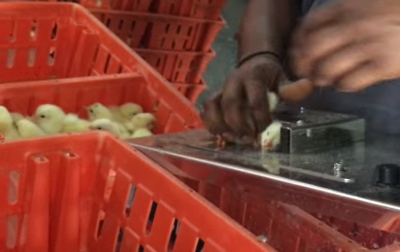
For the backyard keeper there are special vaccination guns available which take 1000 dose vials and can be used with minimal training.
Commercial chicks are processed with as much automation as possible where machines do much of the work. An operator can treat 1000's of chicks an hour with machines.
There are 10 ways that vaccines can be delivered:
They are injected under the skin, quite often the wing web skin is the chosen point, sprayed with or fed the vaccine.
Intramuscular injection involves the use of a hypodermic needle to introduce the vaccine into the muscle of the chicken.
Subcutaneous injection. The vaccine is injected under the skin, usually at the back of the neck, and not into the muscle.
Ocular involves the vaccine being put into one of the bird’s eyes. From here the vaccine makes its way into the respiratory tract via the lacrimal duct. The vaccine is delivered through an eyedropper and care must be taken to ensure that the dropper delivers the recommended dose.
Nasal involves introducing the vaccine into the birds’ nostrils either as a dust or as a drop.
Oral vaccines are given in the mouth. From here it may make its way to the respiratory system or it may continue in the digestive tract before entering the body.
Drinking water is less time consuming and less stressful on the birds and operator.
Cloacal involves the introduction of the vaccine to the mucus membranes of the cloaca with an abrasive applicator. As a rule this technique is little used.
Feather follicle vaccine is introduced into the holes in the skin from where the feathers grow. The technique involves the removal of a group of adjacent feathers or fluff in young chickens, and the brushing of the vaccine into the empty follicles with a short, stiff bristled brush.
Wing stab with special needle. These needles have a groove along their length from just behind the point. When dipped into the vaccine some of the vaccine remains on the needle to fill the groove. The needles are then pushed through the web just behind the leading edge of the wing and just out from its attachment to the body of the bird.
Spraying the vaccine is onto the chickens using a suitable atomiser spray. The vaccine then falls onto the chickens and enters the body of other chickens as they pick at the shiny droplets of vaccine. A small quantity may be inhaled as well.
What equipment do you need to vaccinate chickens?
Equipment varies from a small hand held innoculator to large multi dose automatic machines.
Below: A hand held injector.
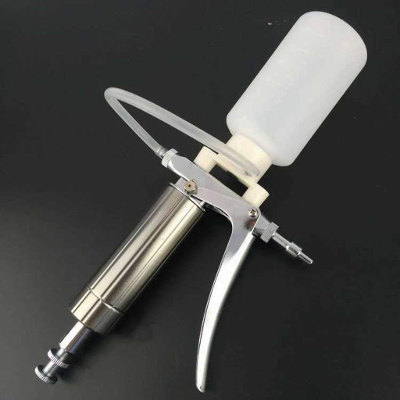
Below: A multi dose automated injector machine.

You will need gloves.
What training do you need to vaccinate poultry?
An expert handler will do it likely without complication, but since chicks are very fragile, it’s also possible they will be injured by poor handling and procedures.
Below: Spray vaccines often have dye included so you can see they have been properly applied.
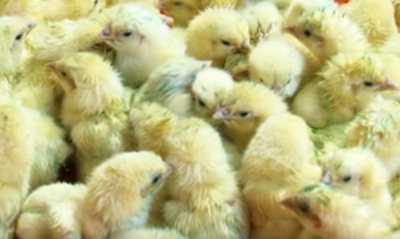
A vet will be able to show you how to do it in a few minutes. Handle the birds with care and for larger chickens make it a two person job.
Where to get vaccines from?
If you decided that vaccinating your flock may be an option then vaccines can be ordered through vets. Buying vaccines for a backyard flock is normally difficult as they are usually produced in large quantities for treating hundreds of thousands of birds.
It is normally possible to buy them in 1000 dose vials that are relatively well priced.
Vaccination schedule:
Where a disease is mentioned more than once in the guide chart that means that a repeat dose is given. Your vaccines may have different names and be given at other times. This is an example vaccination chart for the average plain brown hybrid bought in the UK.
| AGE | DISEASE | VACCINE |
| Day 1 | Mareks | Hatchery Injection |
| Day 2 | Salmonella | LOHMANN VacE* |
| Days 5 | Coccidiosis | Paracox |
| Day 20 and 28 | Infectious Bursal | Intervet Gumboro* |
| Week 5 | Infectiouse Bronchitis/Newcastle | Intervet MA5* |
| Week6 | Salmonella Enteritidis | LOHMANN TAD VacE* |
| Week 7 | Mycoplasma Galliseptum | MG6/85 Spray |
| Week 8 | Infectiouse Bronchitis | Intervet IB4* |
| Week 9 | Avian Rhinotracheitis | Merial Nemovac* |
| Week 10 | Infectiouse Bronchitis/Newcastle | Intervet* |
| Week 11 | Variant Infectiouse Bronchitis | Fort dodge IB Primer D274 |
| Week 13 | Avian Encephalomyelitis | Intervet Nobilis AE* |
| Week 15 | Mycoplasma Galliseptum | MG6/85 Spray |
| Week 16 | Salmonella Enteritidis | LOHMANN TAD VacE* |
| Before Delivery | Newcastle / IB / Egg Drop Syndrome | Intervet Multi |
* means administered in drinking water.
How do you Store vaccines?
Vaccines can be live and require special care. Those requiring refrigeration should be stored in their original packaging in a refrigerator at a temperature between +2°C to +8°C and protected from light.
Vaccines are fragile and must be stored properly from the time they are manufactured until they are administered. The proper way to store vaccines is in a fridge with no chance of freezing.
Some are only viable for a little as 72 hours so need to be ordered and dispensed in good time.
Can chickens catch rabies?
I had this question by email a few weeks ago - Is it necessary to be vaccinated against rabies and is it necessary to be vaccinated against rabies after being bitten by a chicken?
The primary reservoirs are foxes, raccoon's, bats, and rabid dogs. Transmission is by virus laden saliva from a bite, scratch, or abrasion.
In Germany (year unknown) Paarman described 25 Avian cases of Rabies involving 11 chickens, 2 geese, 1 duck, 1 sparrow, 1 owl, 1 crow, 3 hawks, 1 kite, 1 magpie, and 4 buzzards.
So a very rare but not non existent problem. It certainly is not worth vaccinating against rabies in chickens.
I'm tempted to say no problem as nasty chicken tend to attack with their feet and they do not have saliva like dogs do for example.
Treat the bite the way you would any other dirty open wound and if you are worried see a doctor.
